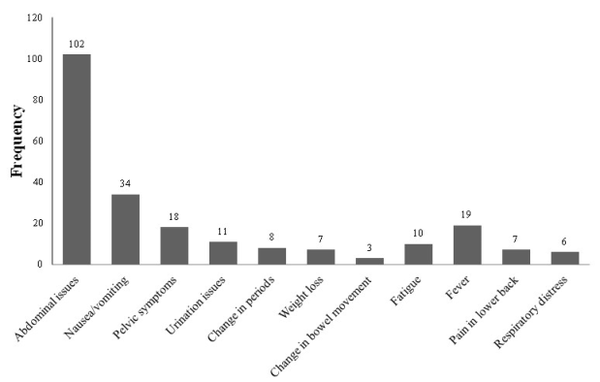-
Home
-
About JCTR
-
Gold Open Access
-
Issues
-
Editorial board
-
Author guidelines
-
Publication fees
-
Online first
-
Special issues
-
News
-
Publication ethics
-
Partners
-
Submit your manuscript
-
Submit your review report
-
Editorial Office
-

This work is licensed under a Creative Commons Attribution-NonCommercial 4.0 International License. ISSN print: 2382-6533 ISSN online: 2424-810X
Volume 8 Issue 1
Evaluation of NRS and NPSI pain scores in advanced ovarian carcinoma patients undergoing surgery and first-line chemotherapy
Sinjini Sarkar, Ranita Pal, Sutapa Mahata, Pranab K Sahoo, Sushmita Ghosh, Puja Chatterjee, Manisha Vernekar, Syamsundar Mandal, Tanmoy Bera, Vilas D Nasare*
Sarkar et al. J Clin Transl Res 2022; 8(1):10
Published online: January 25, 2022
Abstract
Background& aim: Advanced ovarian cancer (OC) has a high disease manifestation with difficult-to-manage symptoms that limit the patients' functionality. Abdominal pain, difficult chronic pain, and neuropathic pain are among the common discomforts associated with OC and its treatment. Our study aims to determine pain scores in advanced OC patients undergoing surgery and chemotherapeutic treatment with carboplatin and paclitaxel.
Methods: 110 patients with advanced epithelial OC were enrolled and treated with surgery and an adjuvant/neoadjuvant chemotherapy regimen of carboplatin-paclitaxel for six cycles (triweekly). Pain intensity was analyzed using the validated Numerical Rating Scale (NRS) for resting, movement, sleep interference-associated pain, and neuropathic pain scores were evaluated using the Neuropathic Pain Symptom Inventory (NPSI) scale. Pain was correlated with Qol according to Fact-O questionnaires. Chemo-response was evaluated using the CA125 blood biomarker and CT scan of the abdomen and thorax. Data were recorded at baseline, 2, 4, and 6 months of the 6 chemotherapy cycles.
Results: Of the 110 patients, no statistically significant differences were found in pain at baseline and after treatment (p>0.05) and between the responder and non-responder categories (p>0.05). However, movement-associated pain had a significant correlation with chemo-response and a strong positive correlation with the patients' physical and functional wellbeing. There were more chemo-induced neuropathy occurrences (p=0.001) in the neoadjuvant chemotherapy group.
Conclusion: Patients in the neoadjuvant chemotherapy arm experienced more chemo-induced neuropathy that was persistent and did not improve with the treatment.
Relevance for patients: Peripheral neuropathy is a common adverse effect of platinum and taxane chemotherapeutic drugs that persists throughout cancer treatment and in survivorship. This research provides evidence that chemotherapy-associated neuropathy affects Qol of patients and it will be helpful to improve pain and palliative care management policies.

DOI: http://dx.doi.org/10.18053/jctres.08.202201.010
Author affiliation
1. Department of Pathology and Cancer Screening, Chittaranjan National Cancer Institute, 37, S.P. Mukherjee Road, Kolkata 700026
2. Department of Pharmaceutical Technology, Jadavpur University, 188, Raja S. C. Mallick Rd, Kolkata 700032
3. Department of Gynaecological Oncology, Chittaranjan National Cancer Institute, 37, S.P. Mukherjee Road, Kolkata 700026
4. Department of Epidemiology and Biostatistics, Chittaranjan National Cancer Institute, 37, S.P. Mukherjee Road, Kolkata 700026
*Corresponding author
Vilas D. Nasare
Department of Pathology and Cancer Screening, Chittaranjan National Cancer Institute, 37, S.P. Mukherjee Road, Kolkata 700026
Tel : (Off.): 91-33-2476-5101 (Extn.-304)
Fax : 91-33-2475-7606
Email: vilas.dr@gmail.com; drvilas_icpo@yahoo.co.in
Handling editor:
Michal Heger
Department of Pharmaceutics, Utrecht University, the Netherlands
Department of Pharmaceutics, Jiaxing University Medical College, Zhejiang, China

